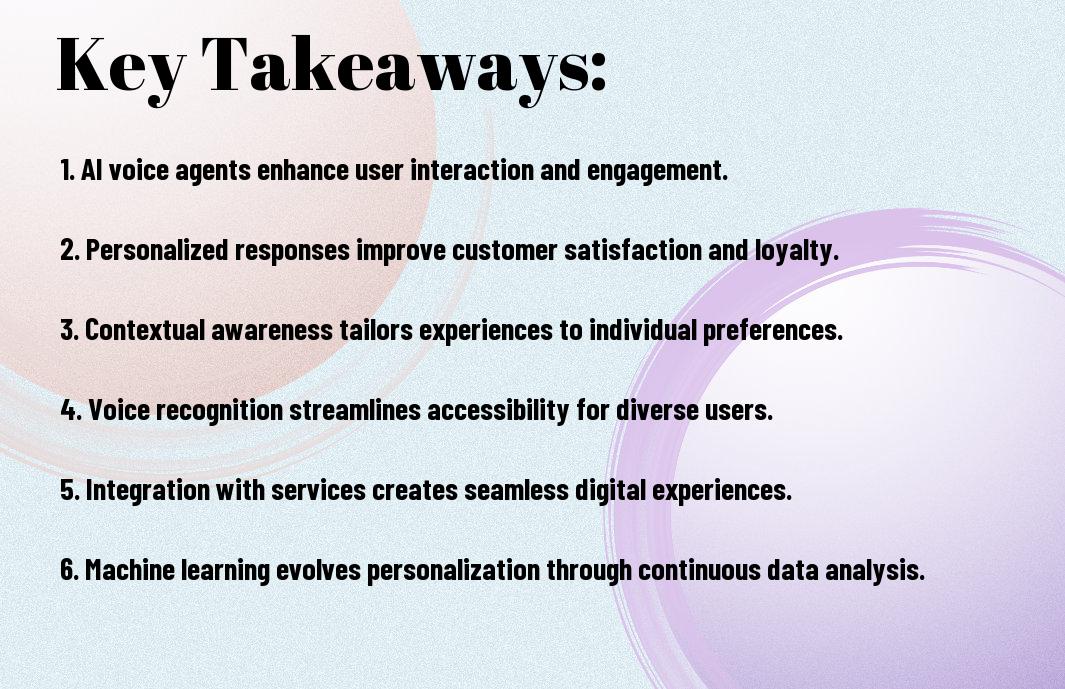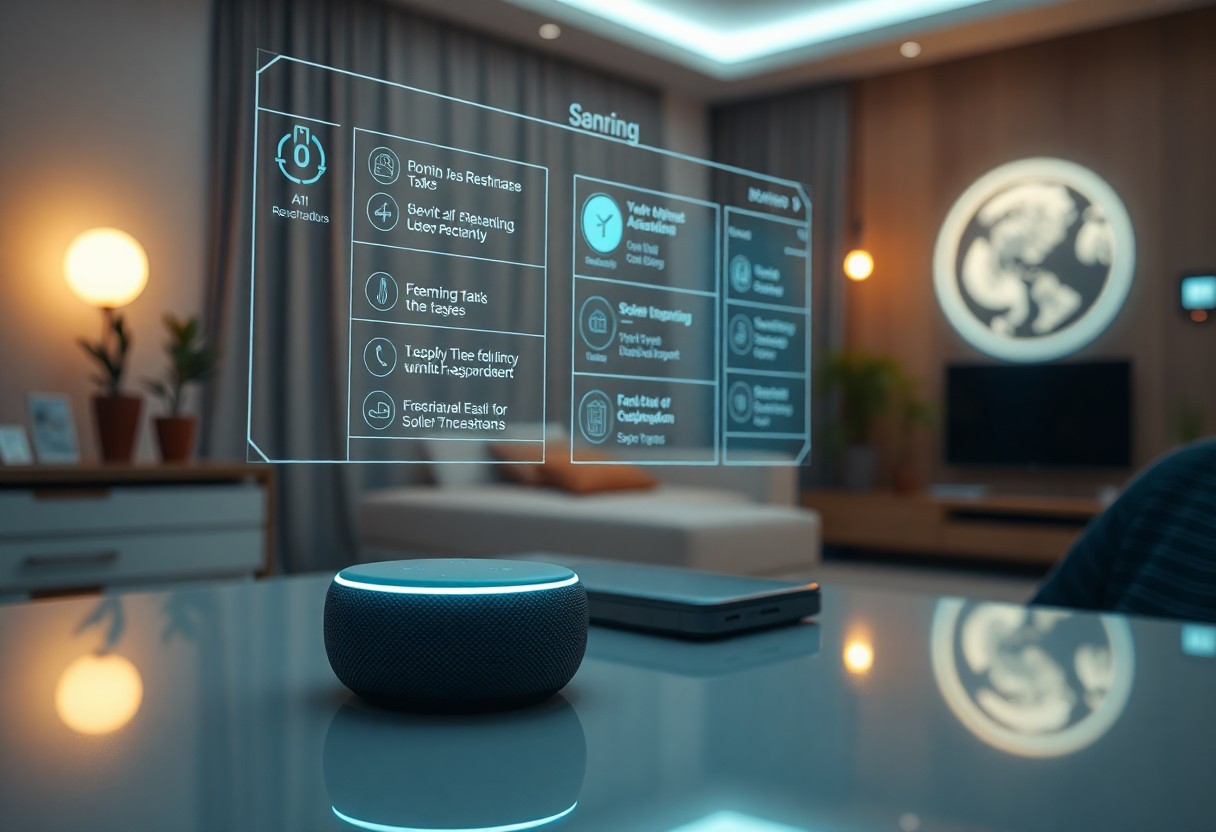AI voice agents are transforming the way you interact with technology, offering tailored experiences designed to meet your unique preferences and needs. By analyzing your behaviors and preferences, these agents create a seamless and personalized digital experience that can enhance your daily interactions. This post will probe into how AI voice agents are reshaping user experiences and provide insights on the impact of Personalizing Customer Experience Through AI. Discover how you can benefit from these intelligent systems in your everyday life.
Key Takeaways:
- Personalized Interactions: AI voice agents offer tailored conversations by analyzing user history and preferences, leading to unique user experiences.
- Contextual Understanding: These agents leverage natural language processing to interpret context, allowing for more relevant responses and smoother interactions.
- Proactive Assistance: AI voice agents anticipate user needs, providing timely suggestions and support based on previous behaviors and requests.
- Multi-Platform Integration: Seamlessly functioning across various devices and platforms, voice agents enhance user engagement by providing consistent and personalized experiences everywhere.
- User Feedback Integration: Continuous learning from user interactions enables AI voice agents to improve their performance and personalization over time.
The Evolution of AI Voice Agents
As technological innovations have progressed, AI voice agents have transformed from simple functionalities to sophisticated companions that enhance your digital experiences. The journey started with basic speech recognition systems and has evolved to intricate algorithms capable of understanding context, emotions, and user preferences, allowing for seamless interactions and personalized services.
Historical Context
One of the earliest instances of voice recognition technology dates back to the 1950s, when it was primarily used in limited applications. Rapid progress continued throughout the decades, leading to breakthroughs that laid the groundwork for contemporary AI voice agents. These advancements reflect a growing understanding of human language, enabling devices to evolve from rudimentary command acceptors to intuitive assistants that understand your needs.
Technological Advancements
By leveraging advanced machine learning and natural language processing techniques, AI voice agents today have become incredibly adept at understanding and responding to your commands. These technologies allow voice agents to analyze vast amounts of data, learn from interactions, and improve their responses over time, tailoring experiences to your specific preferences.
As you engage with these voice agents, be aware of the underlying technologies that empower them. A blend of deep learning algorithms, neural networks, and big data creates a framework that enables voice assistants to not only recognize your words but also grasp the intent and sentiment behind them. This evolution fosters a more personalized interaction, allowing voice agents to assist you in a variety of tasks, from managing your calendar to recommending music or even controlling smart home devices, all tailored to your unique context and preferences.

Key Features of AI Voice Agents
Some of the key features of AI voice agents enhance your digital interactions significantly:
- Natural Language Understanding
- Voice Recognition and Authentication
- Contextual Awareness
- Multi-Device Integration
- Conversational Memory
- Feedback and Learning Capabilities
After exploring these features, you will appreciate how they tailor your experiences to meet your specific needs.
Natural Language Processing
Along with understanding speech, natural language processing (NLP) allows AI voice agents to interpret intent, recognize context, and generate appropriate responses, creating more engaging interactions.
Personalization Techniques
Along with adaptive learning, AI voice agents utilize various personalization techniques to enhance your experience by tailoring responses and services to fit your unique preferences.
This involves analyzing your interactions, preferences, and feedback over time, enabling the voice agent to provide relevant suggestions and anticipate your needs. By leveraging user data and AI algorithms, these agents can create a highly personalized experience, fostering greater engagement and satisfaction as they adapt to your evolving lifestyle seamlessly.

Impact on User Experience
Many users today experience a more intuitive and responsive digital environment, thanks to AI voice agents. These technologies understand your preferences and adjust accordingly, creating a seamless interaction that enhances satisfaction. As explored in AI Voice Agents: Pioneering a New Era of Interactive …, the impact on user experience is transformative in driving engagement and usability.
Enhancing User Engagement
At the heart of personalization, AI voice agents help you connect more meaningfully with digital platforms. By interacting through voice, you find it easier to communicate your needs and preferences, leading to a more satisfying user experience.
Tailoring Content Delivery
Delivery of information is no longer one-size-fits-all, thanks to AI voice agents that adapt to your unique interests and behaviors. As these systems access your data and previous interactions, they present content that resonates specifically with you, ensuring relevance.
Engagement with AI voice agents not only streamlines content accessibility but also tailors your experiences to your current context and needs. By analyzing patterns in your repeated interactions, they can serve you timely updates and suggestions, transforming how you discover and consume content in a personalized yet efficient manner.
Industry Applications
To fully appreciate the transformative power of AI voice agents, it’s important to explore their diverse applications across various industries. These innovative tools are enhancing user experiences by providing personalized solutions in fields such as e-commerce, customer support, education, and healthcare. Understanding how voice agents operate in these areas can help you envision their potential benefits and improve the way you engage with technology in your everyday life.
E-commerce
Between customized product recommendations and seamless order processing, AI voice agents are revolutionizing the e-commerce landscape. With natural language processing capabilities, these agents enable you to search for products, inquire about availability, and complete purchases through voice commands, making shopping more convenient and engaging.
Customer Support
Above all, AI voice agents have transformed customer support by providing instant assistance and personalized interactions. They are capable of addressing inquiries, resolving issues, and guiding you through processes without the need for human intervention, which can lead to quicker resolutions.
But the effectiveness of AI voice agents in customer support goes beyond simple task management. They can analyze past interactions to anticipate your needs, ensuring more tailored responses. By leveraging machine learning, these agents evolve over time, understanding your preferences and enhancing their service, ultimately resulting in a more satisfying experience when you seek help or information.
Challenges and Limitations
Despite the potential benefits of AI voice agents, you may encounter several challenges and limitations. These can hinder your experience, including issues related to privacy, accuracy, and reliability. Understanding these obstacles is crucial as you navigate the landscape of personalized digital interactions.
Privacy Concerns
Between the convenience of AI voice agents and the need for privacy, users often find themselves in a dilemma. Your interactions with these agents can involve sensitive information, raising questions about data security and how your information is stored, processed, and shared by service providers.
Accuracy and Reliability
Reliability of AI voice agents is a vital aspect of your experience. Flaws in understanding context, accents, or idiomatic expressions can lead to misinterpretations, affecting the overall interaction quality. As a user, you may find these inaccuracies frustrating, potentially undermining your trust in the technology.
At the core of accuracy and reliability, you need to recognize that AI voice agents rely heavily on advanced algorithms and extensive data training. If the data input is flawed or incomplete, the resulting performance may not meet your expectations. Continuous advancements in natural language processing and machine learning are crucial to improve agent responsiveness and comprehension. However, variability in performance may still occur, so it’s important to manage your expectations when interacting with these systems.
Future Trends in AI Voice Technology
For the future of AI voice technology, you can expect a deeper integration of advanced algorithms, leading to more sophisticated, context-aware interactions. As natural language processing continues to evolve, voice assistants will become more capable of comprehending nuanced user queries, resulting in highly personalized digital experiences. Additionally, advancements in emotional recognition will enhance the ability of voice agents to respond empathetically, allowing for a more engaging user experience that feels tailored to your individual needs.
Integration with Other AI Disciplines
Behind the scenes, AI voice agents are becoming increasingly intertwined with other AI disciplines such as machine learning and data analytics. This integration enables your voice assistant to draw insights from vast amounts of data, enriching interactions by predicting your needs and preferences. As these technologies converge, you can look forward to a seamless, cohesive digital experience that leverages the strengths of each discipline, ultimately enhancing your engagement with voice technologies.
Emerging Use Cases
On the horizon, you will find various emerging use cases that redefine the capabilities of AI voice technology. These include applications in healthcare, where voice interfaces can assist with patient monitoring and management, and in education, where personalized tutoring experiences are enhanced through voice interaction. Additionally, smart home systems are evolving to provide more refined control through voice commands, optimizing your daily routines.
In addition to healthcare and education, the retail sector is poised to experience significant impact from voice technology, enabling you to shop hands-free and receive personalized recommendations based on your previous purchases. Moreover, as voice agents become integrated with augmented reality, you will be able to interact with digital content in more immersive ways. These emerging use cases not only enhance convenience but also foster greater engagement, allowing your interactions with technology to feel more intuitive and enjoyable.
To Wrap Up
So, as you explore how AI voice agents are personalizing digital experiences, you’ll realize that their ability to understand your preferences and behaviors enhances your interactions with technology. These voice agents not only provide convenience but also create a more tailored experience, making it easier for you to access information and services. By integrating AI voice agents into your daily life, you can enjoy a seamless blend of functionality and personalization that extends the limits of traditional digital interaction.
Q: How do AI voice agents enhance user personalization in digital experiences?
A: AI voice agents utilize advanced algorithms and machine learning to analyze user preferences and behaviors. By processing data such as previous interactions, browsing habits, and explicit feedback, these agents can tailor responses and suggestions uniquely for each user. This personalization makes digital experiences more engaging and efficient, allowing users to find information or services that align with their needs more quickly.
Q: What types of data do AI voice agents collect to personalize experiences?
A: AI voice agents gather a variety of data points to enhance personalization. This includes user demographics, voice recognition patterns, past interactions, command frequencies, and feedback provided during conversations. By understanding these aspects, voice agents can develop a clearer profile of the user, enabling them to offer relevant content and streamline interactions in future engagements.
Q: How can businesses implement AI voice agents for better customer engagement?
A: Businesses can integrate AI voice agents into their digital platforms by utilizing voice recognition technology and natural language processing. This can involve deploying these agents on websites, mobile apps, and customer service channels. By designing these agents to learn from customer interactions, businesses can create a more intuitive interface that adapts to individual user preferences, ultimately increasing satisfaction and fostering stronger customer relationships.

